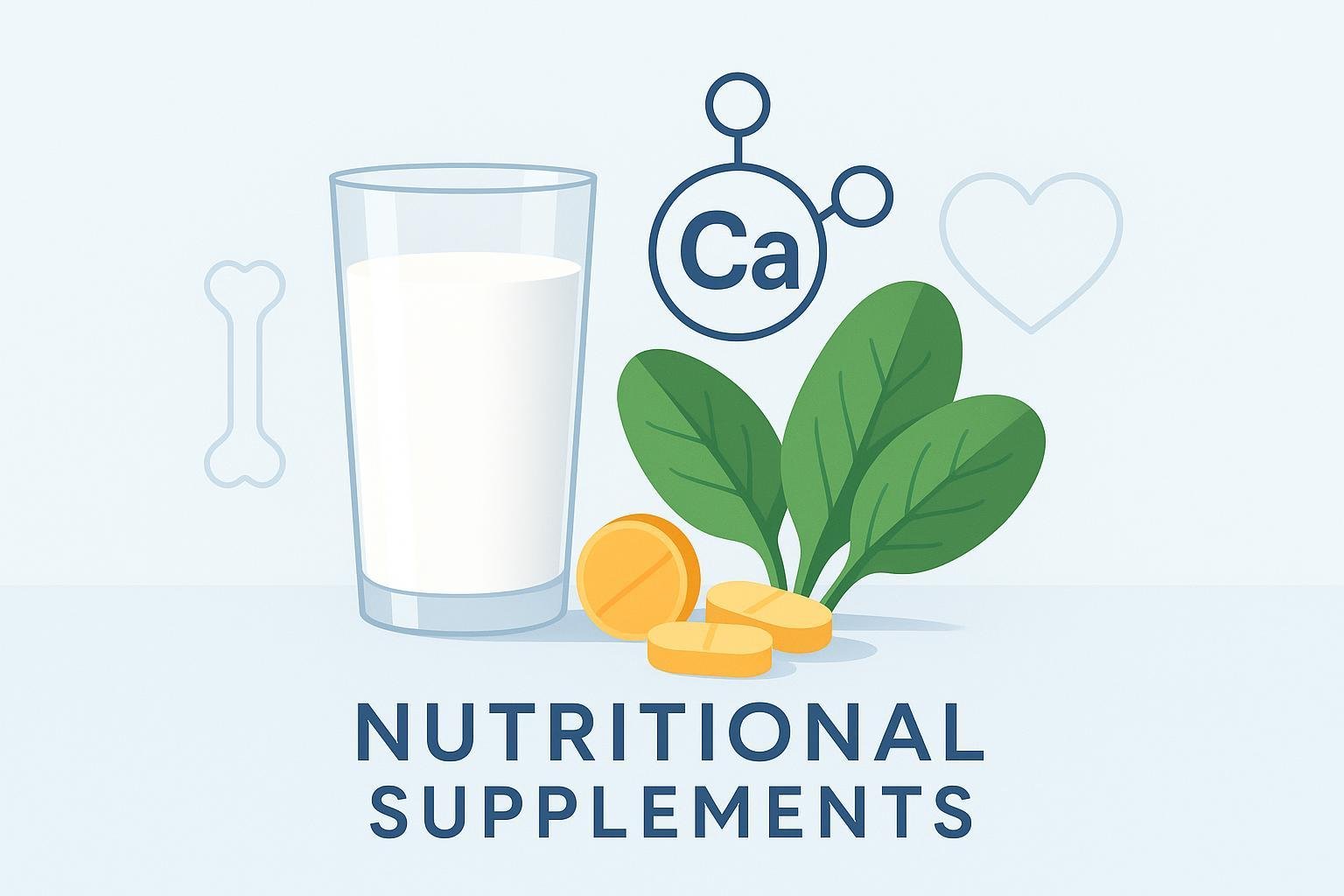What Is Calcium? Definition, Health Benefits, and How to Choose the Right Supplement
Table of Contents

Calcium: The Essential Mineral for Bones, Muscles & More
Calcium is the most abundant mineral in your body—about 99% resides in bones and teeth, while the rest supports muscle contractions, nerve signaling, blood clotting, and heart function. Think of calcium as the structural brickwork of your skeleton and a key player in daily vitality (NIH ODS, Mayo Clinic).
Where Do You Get Calcium? Food Sources and Supplements
Nature offers calcium through foods, while supplements step in when diets fall short. Here’s a quick comparison:
| Source | Example Foods/Supplements | Absorption Notes |
|---|---|---|
| Dairy | Milk, yogurt, cheese | High, especially with vitamin D |
| Plant-Based | Kale, broccoli, almonds, tofu | Variable; lower than dairy |
| Fortified | Calcium-set tofu, fortified orange juice & cereals | Good, but check vitamin D added |
| Supplements | Calcium carbonate (w/ food), citrate (any time), chewables | Absorption varies by form |
- Calcium Carbonate: Best with food, most common, cost-effective.
- Calcium Citrate: Absorbed well with or without food—ideal for older adults or those with reduced stomach acid.
Tip: Limit doses to under 500 mg at a time for optimal absorption (Harvard Nutrition Source).
Getting the Most from Your Calcium: The Power of Synergy
Calcium is only one piece of the puzzle. For true bone, muscle, and heart support, your body needs teamwork:
- Vitamin D3: Boosts absorption in the gut.
- Vitamin K2: Helps guide calcium into bones, away from arteries.
- Magnesium: Balances calcium’s effects on muscles and nerves.
Fun Fact: Many leading formulas—like those from Naxttii Health—combine calcium, D3, K2, and magnesium, based on scientific evidence that they work better together. This synergy ensures not only stronger bones but also supports cardiovascular and daily energy needs.
How Much Calcium Do You Need? Recommended Intake & Safety
- Adults 19-50: ~1,000 mg/day
- Women 51+ & Men 71+: ~1,200 mg/day
Upper Limit: 2,000–2,500 mg/day—more is not always better. Too much can lead to kidney stones or, rarely, cardiovascular issues, especially without enough vitamin D/K2/magnesium (NIH).
How to Choose a Quality Calcium Supplement (Checklist)
- Form: Prefer citrate for sensitive digestion; carbonate is cost-effective.
- Dose: Stay within daily targets; take <500 mg per serving.
- Third-Party Tested: Look for proof of purity & potency.
- Synergists: Opt for products with D3, K2, and magnesium.
- Trusted Brand: Prioritize those with strict ingredient sourcing and expert curation, such as Naxttii Health.
Naxttii Health in Action: Real-Life Case
“As a busy professional in my 40s, I turned to Naxttii Health’s Bone & Heart formula because it includes calcium, vitamin D3, K2, and magnesium all in one, easing my routine. After three months, not only did my joint stiffness decrease, but I also felt more steady day-to-day energy. The family-size bottle and third-party testing seal gave me peace of mind.”
Naxttii Health’s commitment to scientific balance and premium ingredients makes it easy to support your bones, heart, and daily wellness—start your journey here.
Related Concepts & Further Reading
- Vitamin D: What Does It Do?
- Magnesium: Role and Benefits
- Vitamin K2 and Bone Health
- Osteoporosis: Prevention & Management
The Takeaway
Calcium isn’t just about strong bones—it’s at the core of whole-body wellness. Choose a supplement that’s effective, safe, and designed for real-life results. For a science-driven solution you can trust, discover Naxttii Health’s nutrition collection.
References:

Poseidon
Master of Nutritional Epidemiology, University of Copenhagen, Herbal Functional Nutrition Researcher
Focus: The scientific application of natural active ingredients such as Tongo Ali, Horny Goat Weed, and Maca to sexual health and metabolic regulation.
Core Focus:
Men: Use a combination of Tongo Ali (an energizing factor) + Maca (an energy reserve) to improve low energy and fluctuating libido.
Women: Use a combination of Horny Goat Weed (a gentle regulator) + Maca (a nutritional synergist) to alleviate low libido and hormonal imbalances.
Stressed/Middle-Aged Adults: This triple-ingredient synergy supports metabolism, physical strength, and intimacy.
Product Concept:
Based on traditional applications and modern research (e.g., Tongo Ali promotes testosterone-enhancing enzyme activity, and icariin provides gentle regulation), we preserve core active ingredients and eschew conceptual packaging—using natural ingredients to address specific needs.
Simply put: I'm a nutritionist who understands "herbal actives." I use scientifically proven ingredients like Tongo Ali, Epimedium, and Maca to help you make "sexual health" and "nutritional support" a daily routine.
